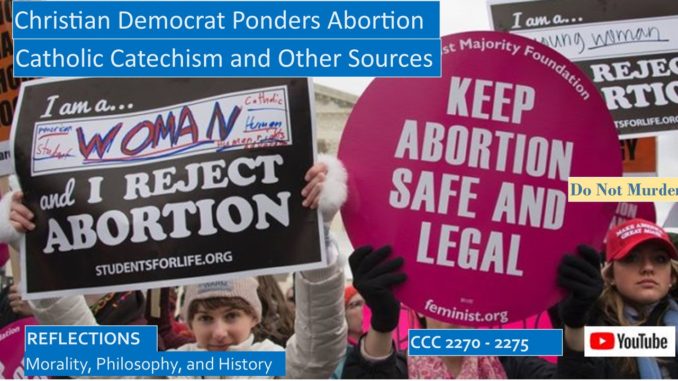
KILLING BABIES IS SINFUL! Killing babies is immoral! Killing babies is murderous! Killing babies is an activity that only the LOST would enjoy!
There, I got it off my chest. I DO NOT BELIEVE IN KILLING BABIES. I AM NOT A BABY KILLER. I just wanted to assure you, dear Gentle Reader, that I am just not fond of killing babies, nor should anyone else be fond of killing babies. This is most certainly true, this is indeed a moral certainty, indeed nobody should enjoy killing babies.
Why am I being so shouty and capitalizing and repetitive about this point? Because many of my Christian friends only want to see the short memes, if they come across a serious and longish article that even suggests that these expectant mothers, many of whom who are facing an incredibly vexing life decision, need our understanding and compassion, many of my Christian friends would jump knee-jerk to the conclusion that the author must think it is OKAY TO KILL BABIES. They judge that morally abortion is a very simple moral issue, that anyone who seeks an in-depth discussion of abortion is morally suspect.
What any truly devout Christian Democrat should realize is they are not obligated to totally accept every position in the party platform, including abortion. But it is most certainly true that any Christian should evaluate what their position on important political and moral issues like abortion. This blog is my personal attempt to ponder this important moral and medical issue.
YouTube video on this blog: https://youtu.be/C4rH6qhhw70
SPIRITUAL DANGER OF INTERNET MEMES
Many people have the impression that Christians should be passionate about their beliefs, that they need to SHOUT AND ATTACK those they see as their spiritual enemies on Facebook, Twitter, Reddit, Quora and everywhere else in the Internet. They do not want to admit that their adversaries are real, live, emotional, breathing human beings that deserve to be treated with respect and dignity, they see everybody else as a tar baby that needs to be set alight and burned.
What is so dangerous about internet memes, those dozen word exhortations of what you think is truth? Internet memes ignore the undeniable fact that life can be complicated and messy, that often in real-life situations what is right and what is wrong can be difficult to discern.
Internet memes can cause well-meaning Christians to go astray from the core principle of Christianity, that you should Love God with all of your heart, with all of your soul, with all of your mind, and with all of your strength, and that you should love your neighbor as yourself. You need to respect God, and you need to respect your neighbor, love is impossible without respect. You show no respect when you judgmentally shout at someone who is forced to make a really difficult life decision, whether it is a difficult pregnancy, divorce, whether to place parents with dementia in a nursing home, they do not need your shouts, they need you to listen and show compassion. Demonizing ladies with problem pregnancies does not help.
There are some really heart-breaking situations involving abortion. Should abortion be allowed if the mother’s and/or the baby’s life is in danger? Should abortion be allowed in case of rape or incest? Should abortion be permitted if it is likely the mother would otherwise commit suicide? Should abortion be permitted to reduce the number of deaths caused by botched abortions by coat hangers or Lysol? To demonstrate the need to be compassionate rather than judgmental, we will review some of the many women’s and doctor’s experiences at the end of this blog.
ARE ARGUMENTS OVER ROE V WADE AND ABORTION POINTLESS?
What most people do not realize about the endless debates surrounding abortion is that they are somewhat pointless. The prosperous can travel to a jurisdiction where abortion is legal. The Supreme Court has already upheld the Hyde Amendment that forbids the use of federal Medicaid funds to fund abortions in the case of rape or incest or where the life of the mother or baby is threatened if they go to term. This greatly reduces the number of abortions performed.
Many people criticize Senator Susan Collins for taking the word of Bret Kavanaugh that Roe v. Wade, the Supreme Court decision, is decided law and will not be overturned. I am a fan of neither, but this simple statement makes perfect sense. Most of the court cases on the abortion issue for the past decade argue the five percent difficult and fringe cases where the parties argue whether the life of the mother and child are truly in danger if the pregnancy goes to term.[1] Roe v. Wade has been effectively neutered by conservative Supreme Court justices already. Also, overturning Roe v. Wade means overturning fifty years of case law. The problems this would create means that Roe v. Wade is probably a permanent fixture of our legal system.
Supreme Court justices are sensitive to the current political climate, they need a degree of assent from the citizenry so the legal system will be respected. However, these justices are also members of the bar association and must adhere to the ethical standards of the legal profession, and they try to go slow when setting precedents in their cases. In medical issues they likewise must take into account the ethical and practical concerns of practicing physicians. This responsiveness to the concerns of the legal and medical community means that Roe v. Wade may never be completely overturned.
POPE FRANCIS AND SOME LEADING EVANGELICALS DO NOT BELIEVE ABORTION IS ALL THAT MATTERS IN POLITICS
Although Pope Francis affirms that the Catholic position on abortion is important, Pope Francis warns that abortion rights should not define Catholicism. Pope Francis also warns that you should not be a single-issue voter, but if you insist on being a single-issue voter, that single issue should be social justice, not abortion. The right to life does not end at birth, and abortion is but a small part of social justice. (Many Catholic magazines have similar articles, the Vox article is well written and quotes from his papal encyclical.) Pope Francis also warns that attacking people on Twitter can be spiritually dangerous.
https://www.vox.com/2018/4/11/17220108/pope-francis-catholics-conservative-abortion-gaudete-exsultate-twitter-church-apostolic-exhortation
The editors of Christianity Today, a leading magazine for Protestant evangelical clerics, scholars, and informed laymen, have a similar message:
https://www.christianitytoday.com/ct/2019/december-web-only/trump-should-be-removed-from-office.html
The gentleman who wrote that editorial took some heat from other Trump loving evangelical leaders, and from Trump’s tweets, so his boss wrote another editorial in his defense:
https://www.christianitytoday.com/ct/2019/december-web-only/trump-evangelicals-editorial-christianity-today-president.html
PONDERING THE MORAL POSITION REGARDING ABORTION
Whether you are Catholic, Protestant, or Orthodox, you would benefit from pondering the guidance offered in the Catholic Catechism on moral issues confronting ordinary Christians today. Many who criticize the Catholic Catechism for its length do not understand its purpose. Unlike the simpler catechisms, the Catholic Catechism intends to provide guidance to the bishops and priests on the many difficult issues their parishioners bring up during Confession, and also informed laymen, and in the spirit of Vatican II, it seeks to present the Catholic position to the modern world in a pastoral and respectful manner.
http://www.seekingvirtueandwisdom.com/who-should-study-the-catholic-catechism/
We do not debate that there are too many girls who are young and foolish and twenty and wanting to party, selfish girls who do not care about their unborn child, foolish girls who do not want the responsibility of motherhood. We agree, and any Christian should agree, that we should do everything we can to encourage these young girls not to abort.
There are six sections in the Catechism on abortion, 2270 – 2275.
CCC 2270 Human life must be respected and protected absolutely from the moment of conception. From the first moment of his existence, a human being must be recognized as having the rights of a person – among which is the inviolable right of every innocent being to life.
Before the advent of modern medicine many thought that abortion was morally acceptable anytime before the quickening of the fetus, which happens from around fifteen to twenty weeks after conception. Now we know that the fetus is alive from the moment of conception.
CCC 2271 Since the first century the Church has affirmed the moral evil of every procured abortion. This teaching has not changed and remains unchangeable. Direct abortion, that is to say, abortion willed either as an end or a means, is gravely contrary to the moral law:
- You shall not kill the embryo by abortion and shall not cause the newborn to perish.
- God, the Lord of life, has entrusted to men the noble mission of safeguarding life, and men must carry it out in a manner worthy of themselves. Life must be protected with the utmost care from the moment of conception: abortion and infanticide are abominable crimes.
CCC 2272 Formal cooperation in an abortion constitutes a grave offense. The Church attaches the canonical penalty of excommunication to this crime against human life. “A person who procures a completed abortion incurs excommunication latae sententiae, (which means) by the very commission of the offense, and is subject to the conditions provided by Canon Law. The Church does not thereby intend to restrict the scope of mercy. Rather, she makes clear the gravity of the crime committed, the irreparable harm done to the innocent who is put to death, as well as to the parents and the whole of society.
The Catechism says: “Direct abortion, that is to say, abortion willed either as an end or a means, is gravely contrary to the moral law.” Whenever church teachings in recent centuries refer to people being used as ends or means, if refers to the dignity of the person. In simple terms, we should not use people, we should love our neighbor as ourselves. At the moment of conception a living person with a soul is formed.
Which abortions are not direct abortions? The US Bishops say this about this important question:
https://www.usccb.org/issues-and-action/human-life-and-dignity/abortion/respect-for-unborn-human-life
Of particular importance is the last paragraph. “Given the scientific fact that a human life begins at conception, the only moral norm needed to understand the Church’s opposition to abortion is the principle that each and every human life has inherent dignity, and thus must be treated with the respect due to a human person. This is the foundation for the Church’s social doctrine, including its teachings on war, the use of capital punishment, euthanasia, health care, poverty and immigration. Conversely, to claim that some live human beings do not deserve respect or should not be treated as “persons” (based on changeable factors such as age, condition, location, or lack of mental or physical abilities) is to deny the very idea of inherent human rights. Such a claim undermines respect for the lives of many vulnerable people before and after birth.”
The bishops do not provide examples of indirect abortions. Indirect abortions include many of the difficult exceptions we discuss in this blog. Exactly which of these exceptions in any specific situation are indirect abortions can be difficult to discern. But we should always repent when life has been lost, and this includes miscarriages also.
Note that abortions performed due to rape or incest would be forbidden according to this definition. However, we should be compassionate in these cases, and certainly not be judgmental for ladies making this terrible choice.
NOTE: Much of the remaining sections of the Catechism are lifted directly from “Donum Vitae”, issued by the Catholic Church in 1987.
THE CATECHISM DISCUSSES LEGAL PHILOSOPHY OF ABORTION
CCC 2273 The inalienable right to life of every innocent human individual is a constitutive element of a civil society and its legislation:
“The inalienable rights of the person must be recognized and respected by civil society and the political authority. These human rights depend neither on single individuals nor on parents; nor do they represent a concession made by society and the state; they belong to human nature and are inherent in the person by virtue of the creative act from which the person took his origin. Among such fundamental rights one should mention in this regard every human being’s right to life and physical integrity from the moment of conception until death.”
“The moment a positive law deprives a category of human beings of the protection which civil legislation ought to accord them, the state is denying the equality of all before the law. When the state does not place its power at the service of the rights of each citizen, and in particular of the more vulnerable, the very foundations of a state based on law are undermined. . . . As a consequence of the respect and protection which must be ensured for the unborn child from the moment of conception, the law must provide appropriate penal sanctions for every deliberate violation of the child’s rights.”
********************************
When reviewing this section of the Catechism, we must remember that there are many countries in Europe and Latin America that are overwhelmingly Catholic, perhaps this paragraph was added in 1987 to provide guidance on what provisions their law codes on abortion should include.
A careful reading of these paragraphs reveals that the Church is suggesting a philosophy of law regarding abortion, the Church is not suggesting specific provisions that must be included in the law. For example, the state could adopt a provision that abortion is acceptable if the life of the baby and/or the mother is endangered without running foul of the guidance in the Catechism.
TECHNICAL ABORTION SECTIONS IN CATHOLIC CATECHISM
CCC 2274 Since it must be treated from conception as a person, the embryo must be defended in its integrity, cared for, and healed, as far as possible, like any other human being.
NOTE: In the context below, the technical meaning of the Catholic word “licit” is roughly equivalent to “permissible”.
Prenatal diagnosis is morally licit, “if it respects the life and integrity of the embryo and the human fetus and is directed toward its safe guarding or healing as an individual. . . . It is gravely opposed to the moral law when this is done with the thought of possibly inducing an abortion, depending upon the results: a diagnosis must not be the equivalent of a death sentence.”
CCC 2275 “One must hold as licit procedures carried out on the human embryo which respect the life and integrity of the embryo and do not involve disproportionate risks for it, but are directed toward its healing the improvement of its condition of health, or its individual survival.”
“It is immoral to produce human embryos intended for exploitation as disposable biological material.”
“Certain attempts to influence chromosomic or genetic inheritance are not therapeutic but are aimed at producing human beings selected according to sex or other predetermined qualities. Such manipulations are contrary to the personal dignity of the human being and his integrity and identity” which are unique and unrepeatable.
********************************
Basically, these sections of Donum Vitae admonish us that medical intervention is permitted to improve the health of the fetus, but that otherwise should be avoided. It is very doubtful that Planned Parenthood or any other medical office in America “produces human embryos intended for exploitation as disposable biological material,” you may not agree with what they are doing, but for the most part they are truly trying to help their patients, they are not bogeymen.
Way beyond the scope of my blog is the multitude of medical ethical issues generated by stem cell research and the harvesting and resale of biological materials both from corpses (and fetuses?) and other things modern medicine makes possible. There are actually medical factories out there that handle this ghoulish stuff, complete with cost accounting software and bio-medical waste disposal. However, these medical factories save the lives and improve the health of countless patients.
Also I have met several ladies who decided to conceive by in-vitro fertilization, which the Catholic Church discourages[2]. Where else will the knowledge in our Pandora’s box of modern medicine lead us tomorrow?
DOES THE CHURCH PERMIT FLEXIBILITY?
Why doesn’t the Catholic Catechism include a paragraph that simply says that abortion is permitted when the life of the baby and/or the mother is endangered? And what about the and/or? Should we say baby, or baby and mother, or can we abort if only the mother’s life is endangered? (Dear Gentle Reader, Dear Somewhat Gentle Mom, In this blog we will only ask these questions, we will not answer them.)
One thing we know for certain, and that is when Cardinal Ratzinger finalized this section of the Catechism, he did not call me and ask for my opinion. But we do know that Catechism is very strident in insisting that preserving the life of the unborn is a very serious matter. We do know it is human nature to take advantage of loopholes when we can. Perhaps the Church did not want to wave a flag about such loophole, even if it exists. This is purely speculation.
What is most certain are the two core teachings of the faith, that we should Love God with all of our heart and with all of our soul and with all of our mind and with all of our strength, and that we should love our neighbors as ourselves. All other commandments are but expressions of these two core teachings of the faith.
We know by definition that these two core teachings are eternally binding, we were created in the image of God, these two core teachings are what make us Christian. But, for all other rules, if a rare occasion arises when an overly strict following of a minor rule causes a conflict with these two core teachings, that we should Love God and love our neighbor, then a dispensation is a possibility, at the discretion of the Church.
Taking away the life of another human being is always horrible. Assessing whether someone is to blame is pointless, you should always confess and repent when you are involved in taking the life of another human being. For example, if the soldiers of the ancient Byzantine Army suspected they may have taken a life during combat, they always confessed this killing to a priest, and they performed penance by abstaining from the Eucharist for several years.
We all know that before Confession we should examine our life and come up with a list of sins, and it is good to come up with a list of sins, but if the priest asks you a general question like, Were you unkind to anyone this week? Did you say anything hurtful or slanderous? Did you think any impure thoughts? Possibly the two best answers are YES, and I DO NOT KNOW. How could you know you were sinless? Not only should we confess the sins we remember, but also the sins we do not remember, and we should confess our sinful nature, and our general schmuckiness.
Likewise, abortion for any reason is always horrible. Taking away the life of another human being is always horrible. Right or wrong, justified or not justified, abortion is not only horrible, it is also traumatic. A compassionate priest will console the trauma. Why torture yourself with blame? Any time a life is taken you should confess and do penance.
We do not want to engage with the standard Protestant debate about whether you should confess to a priest. What is true is that you would benefit talking to an independent professional in addition to your friends when you struggle through the difficult decisions of life. You can confess to your priest or pastor, or you can confess to a compassionate counselor, or both.
We can also be certain that anti-abortion activists who shoot doctors at abortion clinics are certainly murderers:
https://www.theatlantic.com/national/archive/2016/04/planned-parenthood-shooter/477825/
SHOULD THE STATE MANDATE RELIGIOUS MORALS?
Can the state mandate religious morals? Should the state mandate religious morals?
How about murder, rape, theft, fraud, and slander? Most modern states forbid such behaviors, with no push-back, and action can be taken in both criminal and civil courts. And priests and preachers can scold at will.
How about adultery? Most lawyers today have only practiced under the no-fault divorce laws, but nobody in the legal profession ever wants to go back to the days when accusations of adultery were slung back and forth in divorce proceedings. But the priests and preachers are free to scold at will.
How about drinking? The temperance movement a hundred years ago railed about demon alcohol, mad hoop-skirt women took axes to barrels of liquor, so the Prohibition constitutional amendment passed. For thirteen years there was no beer, no wine, no liquor, but instead there were gangsters, shoot-outs, speak-easies, prostitution, deaths from alcohol poisoning, and people just tired of the chaos and mayhem and longed for legal beer. So another constitution amendment repealed Prohibition, and then came the New Deal, happy times were hear again. But priests and preachers are free to scold anyone who will listen.
How about abortion? Should the states allow abortion? Or should it be mother’s choice? Regardless, priests, preachers, and all Christians should actively discourage abortion.
The problem is when you close the abortion clinics, many young pregnant mothers will try to abort on their own. If they try aborting with a coat hanger, or with Lysol, which was an is a common practice, they can die a horrible death:
https://www.theatlantic.com/magazine/archive/2019/12/the-things-we-cant-face/600769/
This is not as much of a problem as in decades past. Dr Google knows everything, and if the pregnant mother asks Dr Google what drug and dosage they should take to abort their baby, Dr Google will tell them without a twinge of guilt. This is much safer than using Lysol, but the question remains, should these ladies be doing this on their own with no doctor in sight?
Certainly, when practical, the state can mandate that young mothers considering abortion receive personal information from someone not formally connected to the abortion clinic about the downsides of abortion.
It certainly is highly hypocritical for a Deep South state to ban abortion when their social safety net is shredded and threadbare, if they refuse to integrate Medicaid with Obamacare, if they restrict food stamps and nutritional counseling, if they have no child-care assistance, if they refuse to pay a living minimum wage and decent unemployment benefits. Forcing the desperately poor to make draconian decisions because nobody will help them definitely is not compassionate.
SHOULD THE STATE MANDATE MEDICAL DECISIONS?
Many people argue that abortion should be permitted in those very rare cases where the fetus will not be viable and will live for at best a day or two after they are born. Ask any doctor, there are a few incredibly grotesque birth defects that have been seen in any practice, the ancient sources refer to them as monsters. Most of the time the body self-aborts these non-viable fetuses. Up to 20% of pregnancies end in miscarriage.
Many doctors suggest abortion for the rare viruses like Zika and Rubella that are absolutely devastating to the fetus.
Sometimes the mother’s life is in danger, sometimes both the baby’s life and the mother’s life is in danger if there is no abortion. Sometimes you can predict such mortality with near 100% accuracy. More often there is a continuum, the doctor can only predict a high or higher certainty of mortality.
What is certain that even if the state passes laws saying that abortion is allowed if there is a high certainty that the baby and/or the mother will not survive, that law could actually discourage abortions from happening in such circumstances. Since such a law encourages litigation that disputes whether there was indeed a high certainty of a fatal outcome, hospitals would see this as an unacceptable legal liability.
Unfortunately, if a young mother desperately wants to abort she may attempt to do it herself with coat hangers or Lysol or whatever. Many doctors support legalized abortion because they get tired of having to clean up after botched abortions. Sometimes the foolish mother will die on the table,[3] sometimes these desperate mothers will attempt suicide. We are not condoning these actions, but we do sympathize with doctors in these situations.
Perhaps we should simply allow the doctor to assert whether such a risk is present and trust his word, and if he is lying let the matter be between him and the patient and Jesus.
HISTORY LEADING UP TO ROE V WADE SUPREME COURT OPINION
Whatever your opinion of Roe v Wade, an informed opinion is preferable to ignorance, so we will review the history of this decision.
Roe v Wade was decided in 1973, following the tumultuous Sixties, a decade of political and cultural change. The birth control pill had just been invented, soon one of five women were on the pill, this was the decade of Woodstock and free love. Betty Friedan’s book The Feminine Mystique was a bestseller. Many years later Friedan recalled that many women called her out of the blue after reading her book, telling her: “It changed my whole life, I decided to go back to school, I decided I would be more than a secretary, I told my husband you’re not the only one around here that counts. I’m a person too.”[4] Every person has dignity.
The Equal Rights Amendment was passed by Congress with an overwhelming majority, but was never ratified by the necessary number of states. The conservative Republican Phillis Schlafly campaigned vigorously against its passage, claiming it was the work of communists and lesbians, spreading fears of unisex bathrooms, the end of alimony and child care, and the end of the traditional family.[5] She would later campaign as a pro-life activist.
New York surprised the nation by passing a liberal abortion law. State Senator Albert Lewis later revealed why he had voted for the bill. Recently he Had been in the emergency room and watched a sixteen year-old daughter of a constituent die from a botched illegal abortion. While she was delirious and dying in her mother’s arms the police were badgering her to give up the name of the abortionist. Senator Lewis chased the police from the room so she could die in peace.[6]
ROE V WADE SUPREME COURT DECISION
Jane Roe was a pseudonym to protect the privacy of Norma McCorvey. Norma met two young attorneys, Linda Coffee and Sarah Weddington, at an Italian restaurant. They told Norma it was unlikely that her case would be heard in time for her abortion, so she gave up the child for adoption, but agreed to allow them to argue her case. Weddington sympathized, while attending law school she and her boyfriend had driven to Mexico for a secret abortion.[7]
Norma was not exactly a paradigm of virtue. She was already six months pregnant; she could not work so she drank and smoked dope. She had already given up two prior children for adoption. She was dead broke and did not feel any attachment to the thing growing inside of her. After giving birth she drank and became more depressed, swallowing dozens of pills to end it all.
Years later Norma was saved and became an ardent pro-life anti-abortion activist, later converting to Catholicism, and received many honorarium speaking fees while she traveled the country as a pro-life activist.[8] Shortly before her death she recanted, claiming her conversion was an act, that she was paid for her activism.[9] What we can learn from this is Norma was just an ordinary person with little education trying to keep her head above water who may have been overwhelmed by the notoriety swirling around her.
When Roe v Wade was being argued before the Supreme Court, the attorney representing Texas argued that personhood began at conception. When the justices asked if abortion should always be legal, no matter how advanced the pregnancy, Weddington answered, “We do not ask the court to rule that abortion is good, or desirable in any particular situation. We are here to advocate that the decision as to whether or not a particular woman will continue to carry or will terminate a pregnancy is a decision that should be made by that individual.” Weddington argued the other extreme, that women should have the right to choose up until the time of birth. [10]
A Supreme Court opinion of this importance needed a clear majority, it would be decided in favor of Jane Roe with six justices affirming and two justices dissenting. The opinion was assigned to Justice Harry Blackmun, recently appointed by Richard Nixon. Blackman was previously the chief counsel for Mayo Clinics and was respectful of how physicians viewed abortion. Blackmun spent thousands of hours researching the abortion issue from both a legal and a medical perspective in the Supreme Court law library and the Mayo Clinic medical library.
There was no direct national precedent for a ruling on abortion, so Roe v. Wade had to create a legal framework under the 14th Due Process Amendment, and also the First, Fourth, Fifth, and Ninth Amendments, and the right to privacy as delineated under the recently issued Griswold case. Based on his research, Blackmun proposed dividing the pregnancy into trimesters. In the first trimester a woman would only need the consent of her doctor for an abortion, the state would be permitted to impose increasingly stiff regulations on abortion in the final two trimesters.
REVIEWING THE ACTUAL ROE V. WADE SUPREME COURT OPINION
Harry Blackmun first reviewed the history of abortion in his opinion, which is not difficult to read, as long as you skip the house-keeping legalese:
https://www.law.cornell.edu/supreme court/text/410/113
Blackmun was well aware of how sensitive the abortion issue was to believers:
“We acknowledge our awareness of the sensitive and emotional nature of the abortion controversy, of the vigorous opposing views, even among physicians, and of the deep and seemingly absolute convictions that the subject inspires. One’s philosophy, one’s experiences, one’s exposure to the raw edges of human existence, one’s religious training, one’s attitudes toward life and family and their values, and the moral standards one establishes and seeks to observe, are all likely to influence and to color one’s thinking and conclusions about abortion.” (2)
Blackmun resolves that:
“Our task, of course, is to resolve the issue by constitutional measurement, free of emotion and of predilection.” (4)
Blackmun reviews ancient history. Although abortion was commonly practiced by many Greeks and Romans, abortion was expressly forbidden by the Hippocratic Medical Oath, and was forbidden by both the Pythagoreans and the Christians, they both believed that life began at conception. However, many Stoics and Rabbis believed that life begins at birth. (35-36,92, and footnotes) (Please note that Roe v. Wade was decided before the issuance by the Catholic Church of Donum Vitae, 1987, and the Catholic Catechism, 1990.)
Under common law abortion was generally permitted before the quickening of the fetus through the middle of the nineteenth century. Due to the risks of abortion procedures, after this the intent of the laws forbidding abortions was to protect the health of the mother. (45-46)
Blackmun notes that while modern medicine has made abortions performed by physicians as safe as childbirth itself, illegal abortion mills have a high mortality rate.(72) The unborn is not considered a person under the Fourteenth Amendment.(88)
SUPREME COURT DECISIONS AFTER ROW V. WADE
Many, many cases on abortion have been appealed to the Supreme Court in the decades following Roe v. Wade. The trimester distinctions are no longer in effect, states are permitted to enact regulations restricting abortion, as long as these regulations “do not place an undue burden on the right to abortion” as previously decided.[11] In particular, the Hyde Amendment, prohibiting Medicaid from reimbursing the cost of abortions unless there is rape or incest or the health of the mother is in danger, has been upheld by the Supreme Court.
PLANNED PARENTHOOD
Yes, Planned Parenthood is politically dedicated to making abortion affordable and available to every lady regardless of their situation. No, most their budget is spent on general per-natal care, because currently federal funds cannot be used for abortions unless the mother’s or baby’s life is in danger.
There is much misinformation about Planned Parenthood, but this is most certainly true: people who work at Planned Parenthood are not bogeymen. This is a good article if you want to learn about the organization:
https://www.theatlantic.com/politics/archive/2018/05/cecile-richards-legacy/559781/
WHAT ARE MY PERSONAL BELIEFS ABOUT ABORTION?
As you can tell from the length of this blog, abortion is truly a moral tar baby. If you do not touch the tar baby and only glance at its outward appearances from twenty feet away, you can yell and scream and shout and maybe even shoot at those who do the evil deed, and think you are righteous and holy condemning those who you think made a sinful decision all day long on Facebook and Twitter and on the abortion picket line.
But if you dare to get one arm, then your other arm, then one leg, then your other leg into that moral tar baby called abortion, and start moving around and educating yourself and pondering and praying about all the sticky morass of moral issues, you will never get free of this moral tar baby, you will never be able to condemn any decision anybody makes about abortion, you will only be able to feel compassion towards those unfortunate few who must decide and who must live with their decision.
Morally, I agree with 100% of what the Catholic Catechism teaches, I am 100% pro-life. What is the true opposite of pro-life? Pro-death? No, I am not pro-death, I am pro-life.
Politically, I am pro-life. Which Christian wouldn’t be pro-life, which Christian would be eager to take a life? But am I also politically pro-choice? IMHO, these are my three basic scenarios[12]:
Scenario 1: The majority case covering 95% of the cases[13] where abortion is considered for purely selfish reasons and there are no health risks, and the mother is not desperately destitute. Am I also politically pro-choice? Personally, I am on the fence here, I just do not know. Would it be okay for the state to enact a reasonable law forbidding abortion?
Scenario 2: The majority case covering 95% of the cases where abortion is considered for purely selfish reasons and there are no health risks, but the mother is desperately destitute, and she lives in a Bible-belt state with a social safety net that is thin and shredded. This is highly hypocritical, in this scenario I would also be politically pro-choice. The Lord would not favor anyone who would throw the first stone in this scenario, especially not those who dare throw any stones after that.
Scenario 3: The minority case covering the five percent where abortion is considered where the life of the mother and/or the baby would be in danger if the baby is brought to term. In this case I would also be politically pro-choice, doctors go to medical school for years and years to learn their trade, I say leave them alone and let them do their job without interference from the state.
So how can I be politically both pro-life and pro-choice? For multiple reasons, having the state compel religiously moral behavior with regards to abortion is problematic. But the state could compel those seeking abortion to attend an independent support group, and they could choose from among religious and secular groups, that could inform them on the downsides of abortion. In the spirit of Vatican II, which I believe applies to all Christians, the faithful should present their vision of love and charity to the world with a pastoral and respectful attitude.
So for 2020 I am okay with the Democratic Party being pro-choice. What about later? Belonging to the Democratic Party is not like joining a personality cult, I am free to disagree with this position or that and still be a Democrat.
SUMMING UP MY PERSONAL BELIEFS ABOUT ABORTION
Permit me to summarize my beliefs more simply. Whether any particular lady and her doctor chooses to have an abortion, that is their decision. Later, after they cross the river and arrive at the great IMAX theater in the sky, where the important decisions in your life are projected on an IMAX screen forty feet wide and forty feet high, when Jesus discusses with them this important life-changing decision, I can predict this: Jesus is not going to ask me for my judgment in this case, nor am I eager to offer it.
Regardless whether any abortion is morally right, or whether it is morally wrong, I will feel compassion for the unfortunate lady and her doctor who make the decision to abort, for this indeed is a very difficult life-changing decision.
As Justice Blackmun notes, abortion is an issue that blooms extreme positions by both pro-life and pro-choice advocates. I am not going to demonize either side of the spectrum, I must presume that most of them mean well. I will also follow the lead of Pope Francis, who does not explicitly mention whether pro-life protesters should yell and scream and shout and torment the poor ladies who walk up to the doors of the abortion clinic.
However, if any of my pro-choice friends invite me to participate in an abortion clinic picket line, I will politely find something else better to do, I think I will pass. I don’t even like asking stores for refunds, I certainly do not enjoy tormenting people.
STORIES ABOUT WOMEN OR DOCTORS ABOUT ABORTIONS
In this final section of my blog I sifted through some of the women’s and doctors stories on the internet. My purpose is not to support any pro-life or pro-choice political arguments, there are stories on both sides. My purpose is not to judge anyone about the correctness of their choices.
My purpose is to provoke compassion over these very difficult and heart-rendering situations. In some stories the women regretted their choices, in some stories the women grieved their difficult choices, in some stories the doctors tell us of the conundrums they face, and some stories you may not like. But there is one fact in common in all these stories: they are all about real, live, breathing, sensitive human beings who have suffered much. People we know or encounter who suffer through similar trials need to be treated with dignity and compassion
This is a collection of stories that include terrifying birth defects, some grateful for Planned Parenthood, many regrets, some who were compelled to abort, rape and abortion, a Downs syndrome baby, many difficult stories:
https://www.theatlantic.com/notes/all/2016/01/personal-stories-of-abortion-made-public/423831/
Malfunctioning ATM saves a baby, several rapes, some sad stories of too young, too destitute mothers, some selfish stories, many ugly stories:
https://nymag.com/news/features/abortion-stories-2013-11/
Four more stories from England, some mums say they have regrets, others say that they do not:
https://www.bbc.co.uk/programmes/articles/3kqkh6td2w65XWWg00MYf1t/abortion-stories-five-women-share-their-experiences
Very sad child abuse, rape, and incest story:
https://www.feministsforlife.org/incest-and-the-abortion-clinic/
Maybe this lady could have given and birth and eventually finished graduate school:
https://www.seattletimes.com/opinion/my-abortion-story-is-very-common/
This abortion doctor says he fears for his safety as two other doctors locally have been shot dead by anti-abortion activists.
Excerpt: “I grew up in the black church and I was conflicted about what it would mean to help women with their unplanned pregnancies,” says Parker, who was raised without much money by a single mother in Birmingham, Alabama.
But then he had an epiphany. He realized that “a safe and early abortion was the Christian thing.” He sees Christianity as “a love ethic, especially around the doctrine of compassion.” Part of that compassion, he believed, was to help young women who had nowhere else to turn. There was a personal dimension for him as well: His own grandmother died in childbirth.
https://www.theatlantic.com/national/archive/2013/01/will-mississippi-close-its-last-abortion-clinic/267352/
Do-it-yourself abortions will become more common as abortion clinics shut down:
https://www.theatlantic.com/health/archive/2015/11/texas-self-abort/416229/
Excerpt: “At age 20,” my mother said, “I had no inkling of the mental and emotional darkness I was about to enter. I couldn’t have grasped the immense psychological toll abortion would take for years into the future–unrelenting tears, guilt, shame, and depression.” While taking full responsibility for her decision to have an abortion, my mother believes she was led to what she calls her “tragic, irreversible decision” by a series of lies and distortions: distortions about fetal development, doublespeak about choice and rights, and glorification of “planned” and “wanted” children.
https://www.theatlantic.com/sexes/archive/2013/07/my-mother-regretted-her-abortion/277722/
One of the reasons why pregnant patients in El Salvador die:
Excerpt: “Some doctors allow ectopic pregnancies—in which a fertilized egg grows outside the womb and can’t survive to birth—to continue until the woman’s Fallopian tube explodes, because they fear that eggs in even ectopic pregnancies will be considered living beings under the law.’”
https://www.theatlantic.com/health/archive/2018/10/how-many-women-die-illegal-abortions/572638/
This is a story of a pro-choice doctor who encounters a moral conundrum:
https://www.theatlantic.com/ideas/archive/2019/08/pro-choice-ob-gyn-confronts-limits-her-beliefs/594151/
[1]Peter Irons, Supreme Court Cases (The Great Courses Plus: 2003), https://www.thegreatcoursesplus.com/history-of-the-supreme-court
Note: in this blog, when I say 5% of abortions are difficult medical decisions and 95% of abortions are selfish decisions, this refers to the women who consider abortion. Only God knows the actual statistics.
[2] In this context discourage means that most priests in most circumstances will readily absolve a mother from her actions in an in-vitro fertilization during Confession.
[3] NEH Hull and PC Hoffer, Roe v. Wade, The Abortion Rights Controversy in American History (University Press of Kansas: 2001, 2020), pp. 99-100
[4] Hull and Hoffer, Roe v. Wade, pp. 89-92
[5] Hull and Hoffer, Roe v. Wade, pp. 136-137
[6] Hull and Hoffer, Roe v. Wade, p. 111-112
[7] Hull and Hoffer, Roe v. Wade, p. 113
[8] Douglas Linder, Liberty on Trial in America: Cases That Defined Freedom (Great Courses Plus: 2020), Lecture 17, https://www.thegreatcoursesplus.com/liberty-on-trial-in-america-cases-that-defined-freedom
[9] https://www.cnn.com/2020/05/20/us/norma-mccorvey-aka-jane-roe-documentary/index.html
[10] Hull and Hoffer, Roe v. Wade, p. 170
[11] Douglas Linder, Liberty on Trial in America, Lecture 17
[12] These three scenarios have nothing to do with any court cases, these are my three personal scenarios on how I personally view abortion.
[13] See footnote 1.

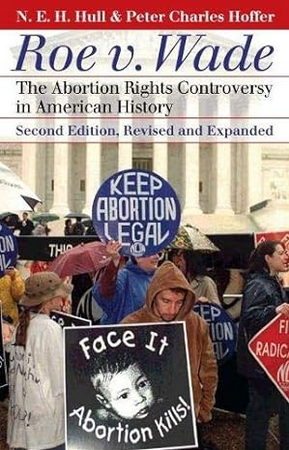
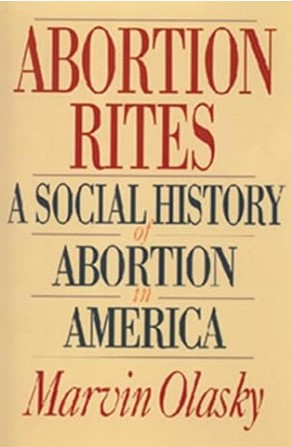
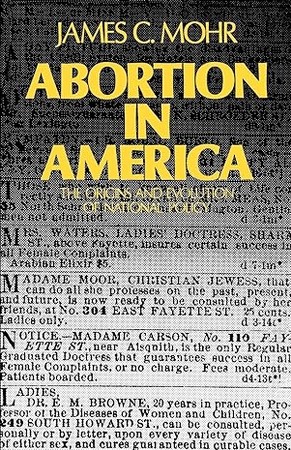
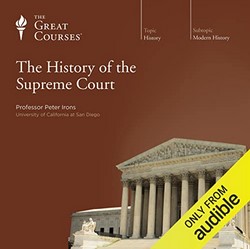
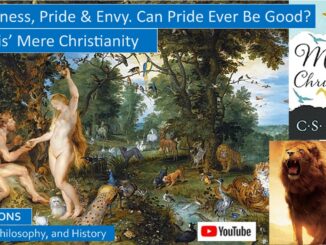
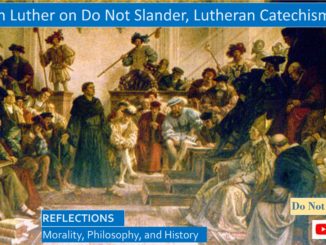
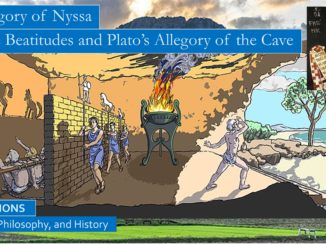
4 Trackbacks / Pingbacks